Cooking Mushrooms: 5 Medicinal Mushrooms You Can Cook With
In a hurry? Click here to read the Article Summary...
Did you know that you’re likely to find more species of fungi, bacteria, and protozoa in a single scoop of soil than there are all the plants and vertebrate animals in North America? Incredible but true – according to Paul Stamets, the American mycologist, author, and passionate mushroom advocate.
In 1991, an intriguing study suggested that less than 5 percent of all fungal species had been identified. Today, an astonishing 5 million species (including yeasts and molds) are estimated to exist on our planet, while the number of species that have been scientifically identified and classified is still very small.
What’s even more fascinating is that researchers all over the world are presently engaged in studying more than 100 species of mushrooms in order to identify their many health benefits – and they are confirming what many ancient cultures have already known for centuries…
Mushrooms contain some of the most potent beneficial ingredients ever found in nature, which we are now learning can support our health in multiple, powerful ways. For instance, while sun exposure is still the best way to get vitamin D, mushrooms can also be an excellent source of dietary vitamin D if they’re grown and dried in the right way.
Further, not only are they rich in protein, fiber, vitamin C, B vitamins, and various minerals, many species of mushrooms are also chockfull of health-promoting antioxidants such as polyphenols and selenium. Many of them also contain antioxidants that are unique to each species.
Even the mycelia of mushrooms – the thread-like vegetative part that branches through the soil – have been shown to provide additional health benefits. No wonder many traditional cultures were in the habit of preparing and consuming healthful tonics made from mushrooms.
What could be the reason for this longstanding connection between us and mushrooms? It seems that evolutionarily speaking, fungi are closely related to the animal kingdom to which we belong. This may be why many of the naturally-occurring ingredients that help mushrooms defend themselves against their enemies in the wild also support our body’s defense mechanisms.
Indeed, growing evidence indicates that mushrooms may be an important piece of the puzzle when it comes to many of our modern health concerns. Not only in terms of helping to manage health issues, but also supporting the body in such a way that helps to prevent problems from developing in the first place. Not only that, most of these mushrooms also provide us with excellent nutrition.
If you know which ones to pick, the majority of mushrooms are extremely safe. As Paul Stamets writes in the introduction to his book MycoMedicinals: An Informational Treatise on Mushrooms, “What is striking is that most of these mushrooms and their ingredients cause very few side effects – if at all – even at very high doses.”
Given the mounting information on mushrooms and their health-giving qualities, it’s no wonder that they are increasingly being seen as a legitimate way to help boost our health and overall well-being, rather than being seen as an alternative healing option on the fringes of society.
A simple way to take advantage of the many health benefits of mushrooms is to include them in your daily diet – but only after first consulting your healthcare provider, especially if you are already on medications for various health conditions.
Mushrooms in Your Diet – Tips for Buying & Cooking Mushrooms
 Fresh or dried edible mushrooms can be found in grocery stores, health food stores, and local farmers markets.
Fresh or dried edible mushrooms can be found in grocery stores, health food stores, and local farmers markets.
It’s important to buy organically grown mushrooms because they’re very porous and can easily absorb chemicals (including toxins) from the soil they’re grown in.
Before cooking, most mushrooms can be wiped down with a clean, damp cloth to remove dirt. Since mushrooms absorb water easily, they should not be rinsed or washed for too long and should be kept dry in the refrigerator. The quicker they are used, the better.
Each type of mushroom needs to be cooked differently. For instance, dried mushrooms should be rehydrated by combining them with boiling water and letting them sit till they plump up. Large mushrooms like portabellas can be baked, but delicate mushrooms like shiitake and button mushrooms are best sautéed lightly in a pan or wok.
Let’s take a closer look at five of these mushrooms, their reported health benefits, and some tips for how you can include them in your daily diet.
#1. Lion’s Mane Mushroom
Lion’s Mane can be found growing naturally on dying and dead trees in Europe, North America, China, and Japan. This unique, ball-shaped fungus with cascading icicle-like spines or “teeth” – known variously as Lion’s Mane, Hedgehog, Monkey’s Head, and Yamabushitake – enjoys the reputation of being a delicious mushroom with a long history of use in traditional Chinese medicine.
Once reserved solely for royal families, Lion’s Mane is made up of 20% protein and is considered by many food aficionados to be a gourmet dish, with a taste similar to popular and nutritious seafoods such as lobster, shrimp, and crab meat.
Lion’s Mane has recently become the focus of many scientific studies for its ability to support brain health, especially in age-related health conditions such as memory loss. Naturally occurring compounds in this unique mushroom have been shown to support the activity of a peptide known as “nerve growth factor” (NGF), which is necessary for the growth, maintenance, and survival of nerve cells in our brain and nervous system (known as neurons).
Tune in to this video to find out which species of mushrooms are chock-full of health-promoting antioxidants such as… watch till the end to find out!
Being an edible mushroom, a simple way to take advantage of Lion Mane’s health-giving qualities – especially if you’re a fan of seafood – is by cooking it. Being a tough and watery mushroom, however, it needs to be cooked slowly for a long time to get rid of its moisture before it can be consumed.
Food aficionados say that the best way to cook this mushroom is in a covered pan on medium to high heat with a little oil until its “teeth” are brown and the desired level of crispiness has been achieved. Any spices or seasoning and butter should only be added just before the mushroom is ready to eat.
Indeed, Paul Stamets, the well-known author and advocate of supplemental mushrooms, writes, “Lion’s Mane tastes best when caramelized in olive oil, deglazed with sake wine, and then finished with butter to taste.”
#2. Reishi Mushrooms
 Reishi mushrooms are widely distributed throughout the world, growing mainly on dead and dying deciduous woods.
Reishi mushrooms are widely distributed throughout the world, growing mainly on dead and dying deciduous woods.
Used for its therapeutic properties over 2,000 years by sages and shamans in many traditional cultures, Reishi – also known as Mannentake, Ling Zhi, or Ling Chi – has the formidable reputation of being able to relax and fortify both mind and body. No wonder this fungus holds a very important place in the traditional medical systems of China, Japan, and Korea!
While Reishi mushrooms are traditionally prepared as teas or infusions, modern preparations include capsules, tinctures, and fractionated extracts. Nowadays Reishi is also being added to chocolate bars, candies, energy drinks, and even coffee blends.
In addition, Reishi appears to be a highly beneficial mushroom for health and is being carefully studied to identify its many health benefits. For instance, Reishi helps the body to get rid of toxins more efficiently, counters free radicals, and supports the liver’s metabolic efficiency. Some health experts believe that Reishi may help to counter some of the symptoms of aging and reduce cellular damage associated with oxidative stress in our body.
Reishi also supports the immune system and is routinely given to people to maintain their healthy inflammatory response. Reishi also helps to support blood pressure within a normal range.
Reishi mushrooms can be cooked in different ways:
- Stewing in tea – Reishi tea can be made by first soaking dried Reishi mushrooms in water for at least eight hours, or overnight. In the morning, remove the mushrooms from water. The water should be placed in a clean pot after straining and heated over medium to high heat to the boil for 5-10 minutes. Then allow the tea to cool down and enjoy.
- In soup – another healthy way to prepare Reishi mushrooms is by making them in a soup. Soak the mushrooms overnight. Remove and sauté them in olive oil, salt, and seasoning. Add to the soup of your choice.
- Grilled – Reishi mushrooms can also be grilled. Soak the mushrooms overnight. Remove from water, and place the mushrooms on foil. Add a small amount of olive oil, garlic, and other seasoning. Wrap up the foil and place it on a grill that has been heated to medium-high heat. Cook for five minutes on each side before serving.
#3. Shiitake Mushrooms
Shiitake – also known as Black Forest mushroom – is native to Japan, Korea, and China and is one of the most popular mushrooms around. Both fresh and dried Shiitakes are commonly used ingredients in East Asian cooking.
This exotic fungus, which grows naturally on dead and dying broad-leaf Asian oaks and beeches, is also being studied to understand and exploit its many reported health benefits. For instance, Lentinan, a potent polysaccharide present in Shiitake, has been shown to help improve the quality of life, extend survival, and slow down aging, with very few side effects.
Consuming Shiitake has also been shown to stimulate the immune system, including gut immunity, and support the body’s healthy inflammatory response.
Shiitake mushrooms also have antiviral, antibacterial, and antifungal qualities. Uniquely for a plant, they contain all eight essential amino acids along with a type of essential fatty acid called linoleic acid.
Fortunately for us, Shiitake mushrooms are considered to be earthily delicious when cooked properly. They can be added to many types of dishes, from breakfast to soups, appetizers, and entrees.
Some suggestions for including Shiitake in your diet include:
- With eggs – Shiitake mushrooms should first be sautéed lightly in olive oil or butter until softened and gently caramelized. They can then be added to scrambled eggs made according to your preference, using fresh herbs and seasonings of your choice.
- In soup – crispy, lightly fried shiitake mushrooms make the perfect topping for soups, especially creamy squash-based soups in which their earthy flavor offers a counterpoint to the sweet squash.
- With salmon – Shiitake mushrooms can be combined with fresh salmon in many delicious ways – such as smoked salmon and sautéed shiitake on toast; Shiitake mushrooms cooked down into a sauce and poured over salmon; marinating the mushrooms and salmon together in a soy-based sauce before grilling; and making a miso soup with noodles, salmon, shiitakes, and mixed greens.
- As pizza topping – Lightly sautéed shiitake mushrooms can be substituted for regular button mushrooms as topping for homemade pizzas and served along with cheeses and fresh herbs like basil, parsley, chervil, or cilantro.
#4. Maitake Mushrooms
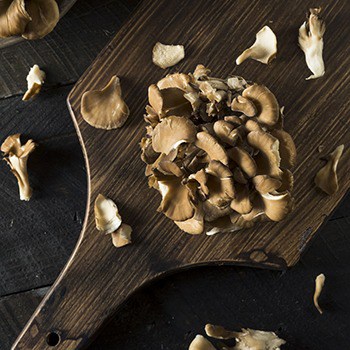 Maitake mushrooms – also known as Hen of the Woods and the Dancing Mushroom – typically grow in northern temperate, deciduous hardwood forests in the U.S., Canada, Japan, China, and Europe where they have been used both as food and in various tonics for their health-giving qualities.
Maitake mushrooms – also known as Hen of the Woods and the Dancing Mushroom – typically grow in northern temperate, deciduous hardwood forests in the U.S., Canada, Japan, China, and Europe where they have been used both as food and in various tonics for their health-giving qualities.
Maitake mushrooms are known to be rich in vitamins. Additionally, laboratory studies and small-scale clinical studies in people have shown that they can help stimulate specific cellular components of the immune system, along with helping to manage blood sugar levels, and balancing hormone levels.
Because they are large and feathery, Maitake mushrooms must be chopped or cut into manageable pieces before sautéing, grilling, searing, or adding to a sauce or soup. Like Shiitakes, lightly sautéed maitake mushrooms can be used as topping with cheeses and fresh herbs for homemade pizzas or used to make miso soup with noodles and mixed greens.
#5. Oyster Mushrooms
Oyster mushrooms are found in every temperate and tropical forest all over the world, growing on dead and decaying broad-leaf hardwood trees. Along with button or Cremini mushrooms, porcinis, portabellas, and morels, they are extensively used as food because they are rich in nutrients, minerals, and antioxidant compounds.
Laboratory studies show that oyster mushrooms have antifungal activity and help to lower levels of fats in the blood. Further, studies in both mice and humans show that oyster mushrooms help to lower blood sugar levels and increase insulin levels.
Oyster mushrooms have also been reported to support joint health and reduce muscle aches. They are reported to promote heart health, able to help strengthen blood vessel walls and lower risk for heart attack or a stroke. They are also believed to help correct iron deficiencies, especially in people who don’t eat much meat or who eat no meat at all.
Like oyster mushrooms, ordinary button or Cremini mushrooms, porcinis, portabellas, and morels are also full of protein, minerals, and vitamins including copper, potassium, selenium, phosphorus, and zinc, niacin (vitamin B3), and pantothenic acid (vitamin B5).
A WORD OF CAUTION: Obviously if you have an allergy or sensitivity to mushrooms, then they should NOT be part of your diet. Because mushrooms are so potent, it is also advisable to check with a qualified healthcare practitioner before consuming foods or supplements made with mushrooms as they can potentially impact different types of medication and health conditions.
7 Mushrooms from Organixx contains 7 of nature’s most powerful mushrooms for anti-aging, longevity, and immune support. Using centuries-old knowledge of the power of nutritional mushrooms and our breakthrough new formulation process we’ve unleashed the power of mushrooms in a way never before done.
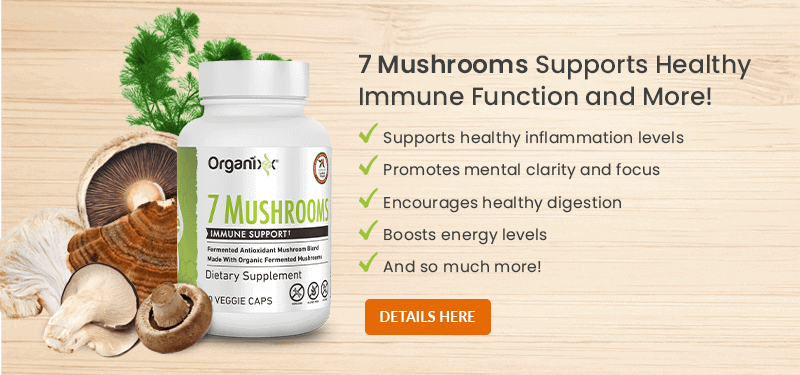
 Sources:
Sources:
Article Summary
A 1991 study suggested that less than 5% of all fungal species had been identified.
Mushrooms contain some of the most potent beneficial ingredients ever found in nature, and can support our health in multiple, powerful ways.
Not only are they rich in protein, fiber, vitamin C, B vitamins, and various minerals, many species of mushrooms are also chockfull of health-promoting antioxidants such as polyphenols and selenium.
Evolutionarily speaking, fungi are closely related to the animal kingdom to which we belong.
Tips for buying and cooking mushrooms:
- It’s important to buy organically grown mushrooms because they’re very porous and can easily absorb chemicals (including toxins) from the soil they’re grown in.
- Before cooking, most mushrooms can be wiped down with a clean, damp cloth to remove dirt.
- Each type of mushroom needs to be cooked differently.
5 types of medicinal mushrooms that are often used for cooking include:
- Lion’s Mane
- Reishi
- Shiitake
- Maitake
- Oyster


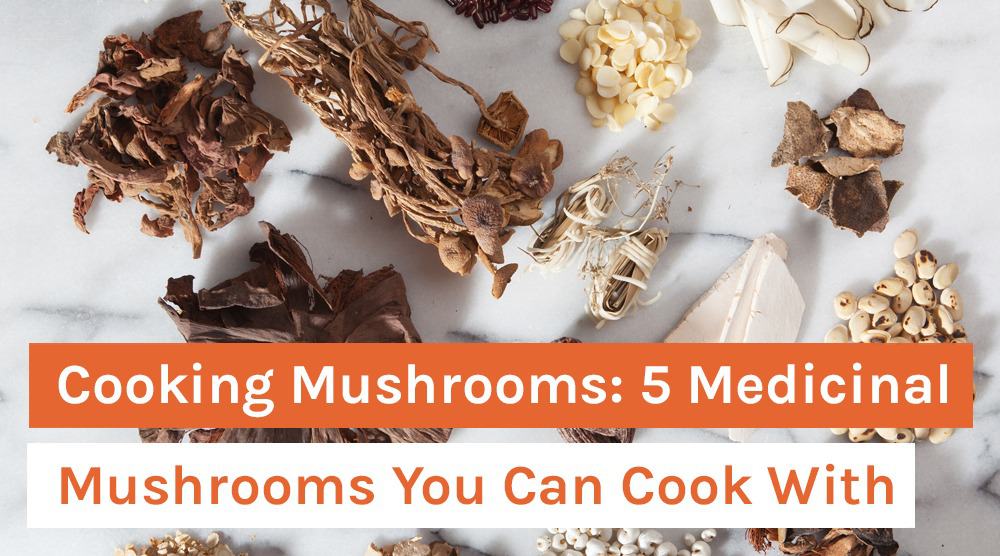
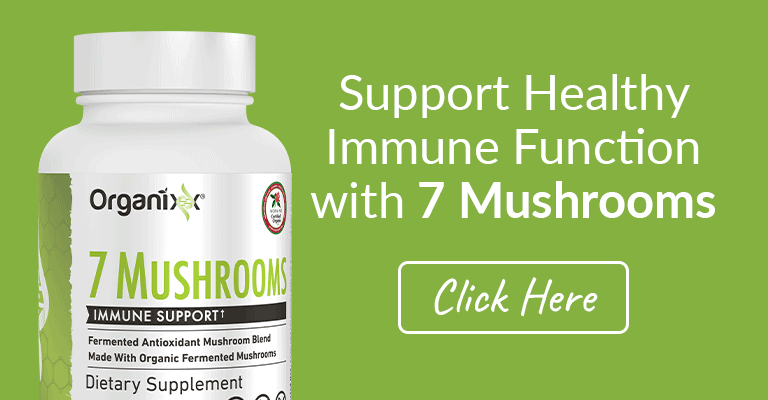
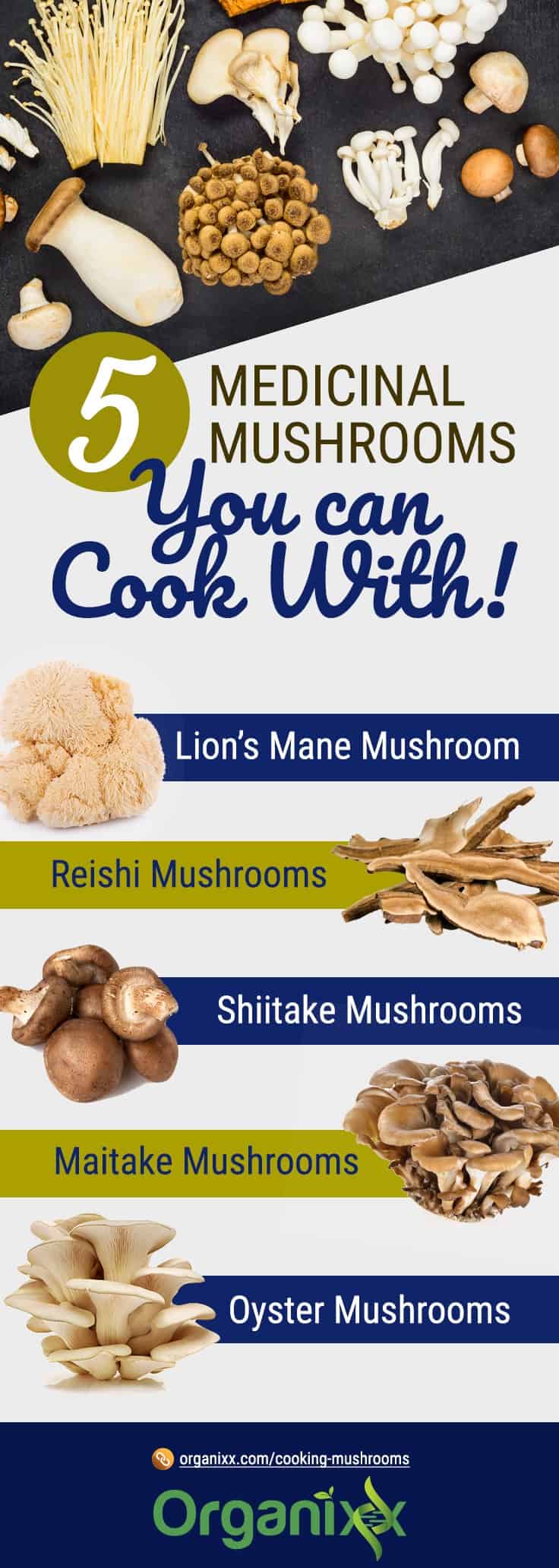

Can I get your Organixx 7M+ supplement in a loose condition. I cannot swallow capsules.
Hi Letha, thanks for your interest.
Please know that our 7M+ capsules contain a powder that can be added to any beverage or food and consumed that way if preferred.
You can also open the capsules and add to recipes such as smoothies, puddings, salad dressings, etc.
We hope this helps and wish you a happy & healthy day.
If you live near a Whole Foods you can find organic mushrooms there. They have a decent selection.
A lot of concern about health issue concerned with contamination with toxic material. Where to find organic safe mushroom out of the industrial waste environment?
Hello Ahmed, Yes, this is a concern for a lot of people. Try your local farmers market. They usually have organic fruits, vegetables and mushrooms. Thank you for being here with us. Enjoy your day! :)
Can you tell me how much Iron is in the 7M I am already taking Multivitamin that has added Iron .I believe that too much
Iron is detrimental to one health.
Hi Patricia Murray, thanks for your question.
You can find the full ingredient label of our 7M+ supplement via the product page here: https://shop.organixx.com/products/7m-plus
Thank you for being here with us and for being a valued customer. We hope you have yourself a lovely day!
I’ve heard of the health benefits of medicinal conks but that their growth causes rot in trees and that they can either be found on decaying logs or infecting trees. Does where growth happens an indication that maybe the conk is not good to use for health?